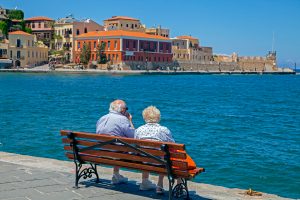Greek senior citizens now make up 16.9% of the population, as reported in a recent paper published by researchers at the National School of Public Health in Athens. This demographic shift has been driven by technological advances, nuclear family structures, economic disparities, and social changes. However, what is the status of the elderly in Greek society today, and what challenges do they face in a rapidly changing world?
The Pivotal Role of Seniors in Greek Family Life
The family unit remains central to Greek society, with seniors playing a pivotal role. Greek families typically maintain close relationships, often with multiple generations living nearby or even under one roof. Traditionally, elderly relatives in urban areas live in the same apartment building or neighborhood as their children, fostering daily interactions and strong familial bonds. This close proximity ensures that senior citizens remain integral to family life and decision-making processes.
A 2007 socio-psychological study conducted in Greece underscored the importance of senior citizens in the lives of grandchildren. Greek grandparents often play a significant role in childcare, especially given the scarcity of nurseries and kindergartens. Their involvement helps them feel useful and important, reinforcing their role in Greek society. Beyond babysitting and cooking, they manage households and contribute financially through their pensions, which, though modest, are crucial for the stability of multi-generational households. Grandparents also pass on cultural values and traditions, serving as custodians of Greece’s rich heritage.
Challenges and Support Systems
Despite their significant contributions, Greek seniors face challenges, particularly in healthcare and social support. The economic crisis of the past decade has strained public services, making it harder for seniors to access necessary care and resources. However, strong family support mitigates some of these challenges, with relatives often stepping in to help.
To address these issues, the Greek government and various NGOs have implemented programs to improve seniors’ quality of life. These initiatives include enhancing healthcare services, promoting active aging, and providing opportunities for lifelong learning. Recognizing the importance of non-institutionalized care for generally healthy elderly individuals facing social challenges, the Greek state established the Open Care Centers for the Elderly (KAPI) in the early 1980s. Today, the 370 Centers nationwide offer social support, preventive medical services, and opportunities for socialization and organized activities. These centers encourage the elderly to maintain control over their lives and engage in physical and mental exercise, helping them stay alert and independent.
It can thus be seen that Greece’s socio-cultural framework profoundly influences the care and integration of the elderly by emphasizing strong family bonds and community support which enhance the quality of life for Greece’s aging population.





